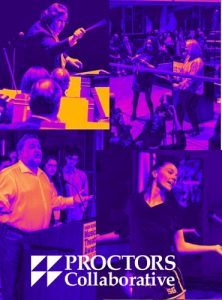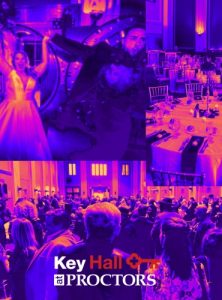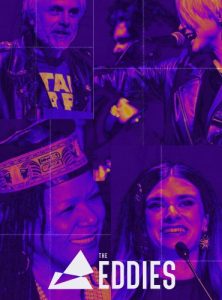Eddies Hall of Fame Class of 2026
Ernie Williams
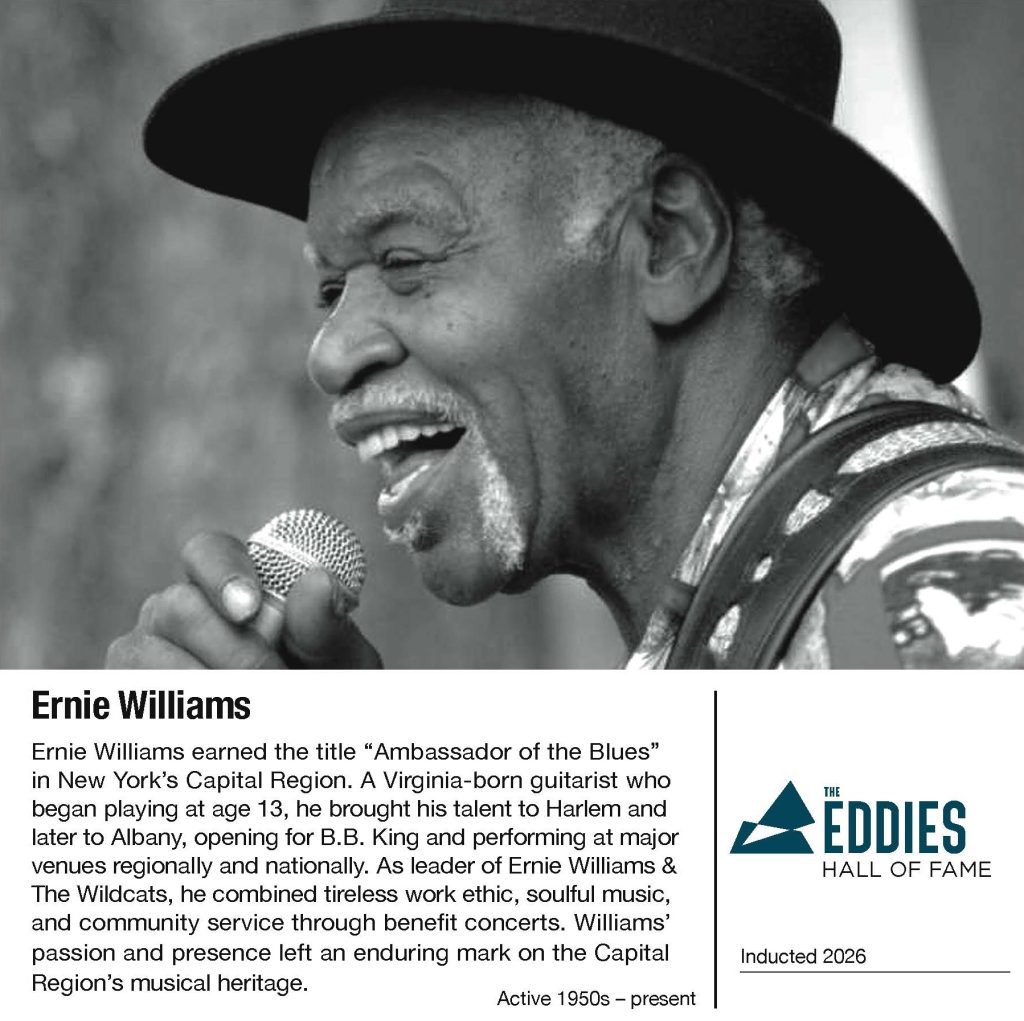
Read more
In the 1960s he made greater Albany his home, settling in the region and earning a reputation as a hardworking and soulful “King of the Blues.” Over his long career Williams opened for such legends as B.B. King and performed at venues including Boston’s House of Blues and Chicago’s Buddy Guy’s Legends.
In 1990, he asked guitarist and songwriter Mark Emanatian to join him, soon recruiting Rocky Petrocelli on drums and Joe Mele on guitar—thus forming Ernie Williams and the Wildcats. What followed was extraordinary: the group released four albums of original material written by Williams and Emanatian, recorded two live albums, and performed across 15 states, Washington D.C., and Canada. From festivals and concert halls to roadhouses, they wowed audiences and garnered widespread acclaim while raising thousands of dollars for charity.
Williams led his band — later renamed The Ernie Williams Band — with boundless energy, often playing multiple gigs in a day and turning every performance into a celebration. His deep commitment to the community was equally defining, as he frequently performed benefit concerts for organizations including the Hunger Action Network and the Regional Food Bank of Northeastern New York.
Williams died in March 2012 at age 87, leaving behind a legacy of vibrant musicianship, generosity, and a lifetime spent lifting others through the blues.
Heavenly Echoes
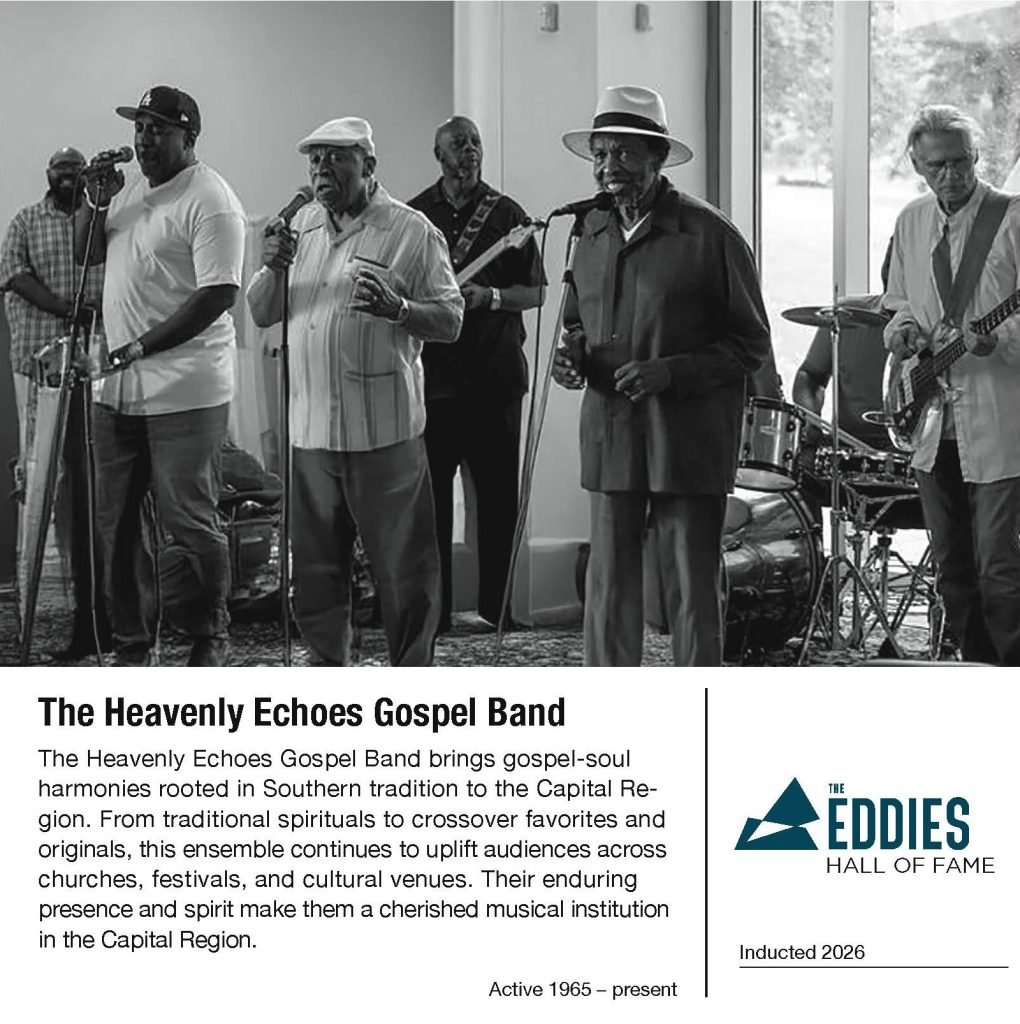
Read more
Over the decades, the ensemble has evolved but consistently delivered powerful live performances throughout the Capital Region—from church basements to major cultural festivals and institutional venues such as the Tang Teaching Museum in Saratoga Springs. The group mixes original compositions with gospel standards (“Precious Lord, Take My Hand”), crossover classics (the Staple Singers’ “I’ll Take You There”), and contemporary gospel benchmarks.
With a flexible lineup committed to musical excellence and spiritual uplift, The Heavenly Echoes remain a vibrant part of the region’s musical fabric—inviting all ages and welcoming audiences beyond the church community.
Jim Furlong
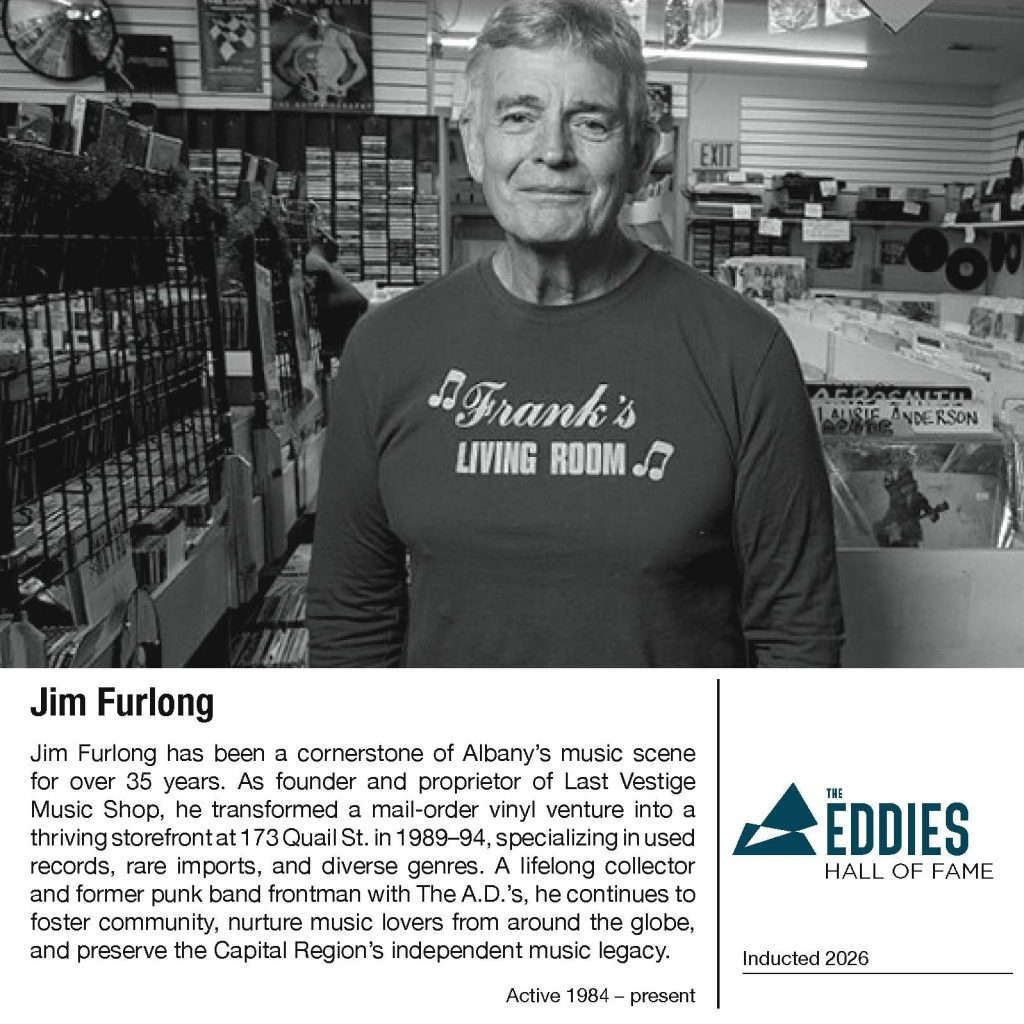
Read more
Before launching his own shop, Furlong gained valuable experience working at some of the Capital Region’s most influential record stores. At Just A Song, he learned the fundamentals of brick-and-mortar music retail—including ordering, inventory, and customer service—under the mentorship of the late David Schlang. At World’s Record, Albany’s first used record store, he honed his expertise in used-vinyl sales and collector culture under Steve and Peggy Erfurt.
When his punk band, The A.D.’s, moved to New York City in 1983, Furlong continued developing his skills by working at Midnight Records in Chelsea, where he learned the mail-order side of the vinyl collector business from the late J.D. Martignon. Furlong also acknowledges the influence of Felix Iavarone, a pioneering local record dealer who sold vinyl out of his family’s shop, Joseph’s Custom Tailors on Madison Avenue, ran a small mail-order business, and organized Albany’s first record collector fairs in the 1980s—preceding Jim’s Vinyl Lust Record Fairs.
These formative experiences shaped his approach to entrepreneurship and inspired the creation of Last Vestige—a record shop rooted in authenticity, community, and deep respect for music history.
Over three decades later, Jim continues to operate Last Vestige as a cornerstone of the Capital Region’s independent music scene—curating an eclectic inventory that attracts collectors worldwide while preserving the spirit and legacy of local music culture.
Dominick Campana
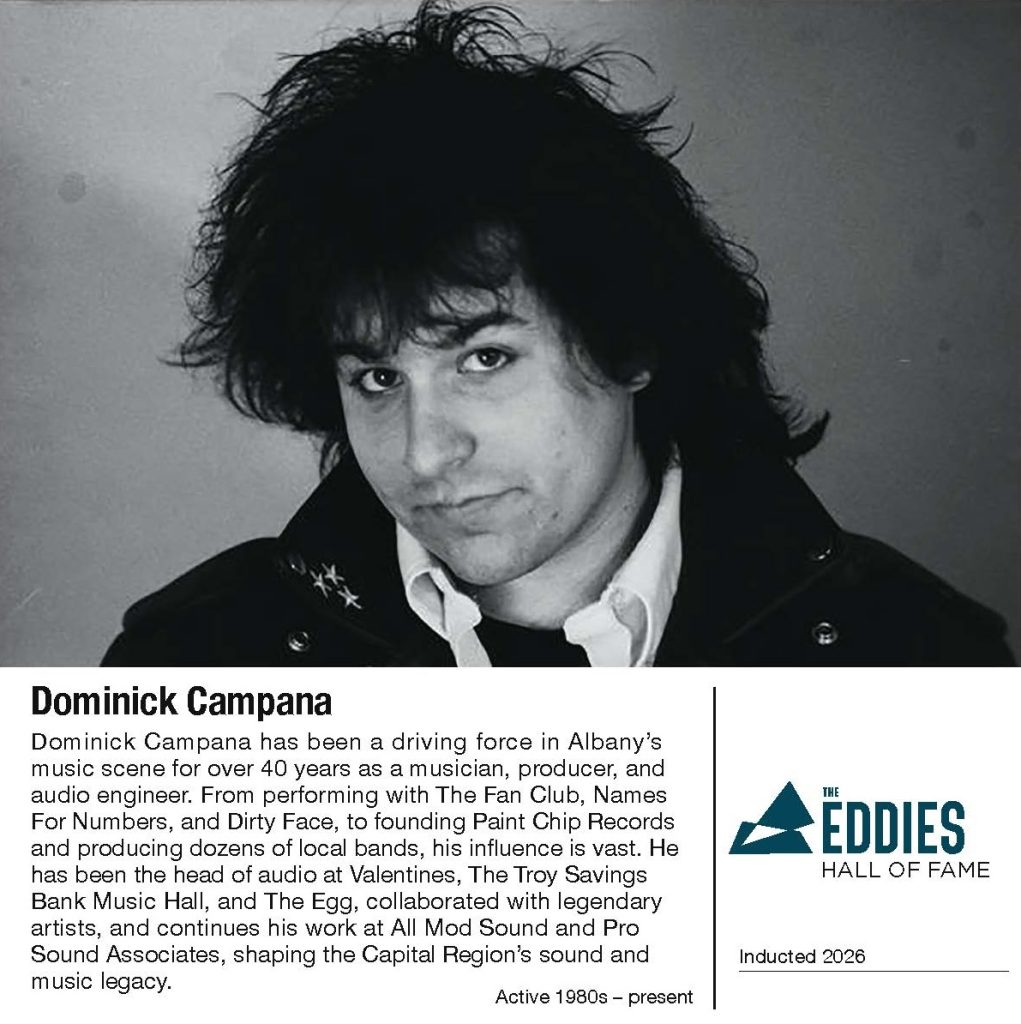
Read more
Dominick began as the lead guitarist for The Fan Club (later Names For Numbers) in the early 1980s, playing Albany’s local venues and opening for national acts like The Replacements. He went on to form Dirty Face in ‘85, a band that released multiple albums, toured nationally, and became a staple of venues like 288 Lark, Duck Soup, and QE2, sharing the stage with artists including Soul Asylum and The Goo Goo Dolls.
Dominick’s experience on stage led naturally to work behind the scenes. In 1993, he founded Paint Chip Records, a co-op label supporting dozens of local bands, producing and engineering records for acts such as Bloom, Lughead, The Wait, and many others.
A highly respected audio engineer, Dominick has worked at numerous recording studios in Albany, Boston, Memphis and New York. As a highly skilled live sound engineer, Dominick was the head of audio at Valentines, Troy Savings Bank Music Hall, and The Egg. He has worked with hundreds of local/regional groups and dozens of world-renowned artists, collaborating with luminaries such as Diana Krall, Bela Fleck, The Marsalis Brothers, and The Zombies, as well as engineering non-musical events featuring Hillary Clinton and Barbara Walters.
Dominick currently runs Pro Sound Associates, designing and installing sound systems for schools and athletic facilities, while continuing his recording and producing work at his home studio, All Mod Sound. As a solo artist, his 2021 album “Back Pocket” and 2024 single “It’s Never All Right” earned Eddies Music Award nominations, with new material on the upcoming album “Triggers and Waves” further showcasing his artistry.
Eddie Angel
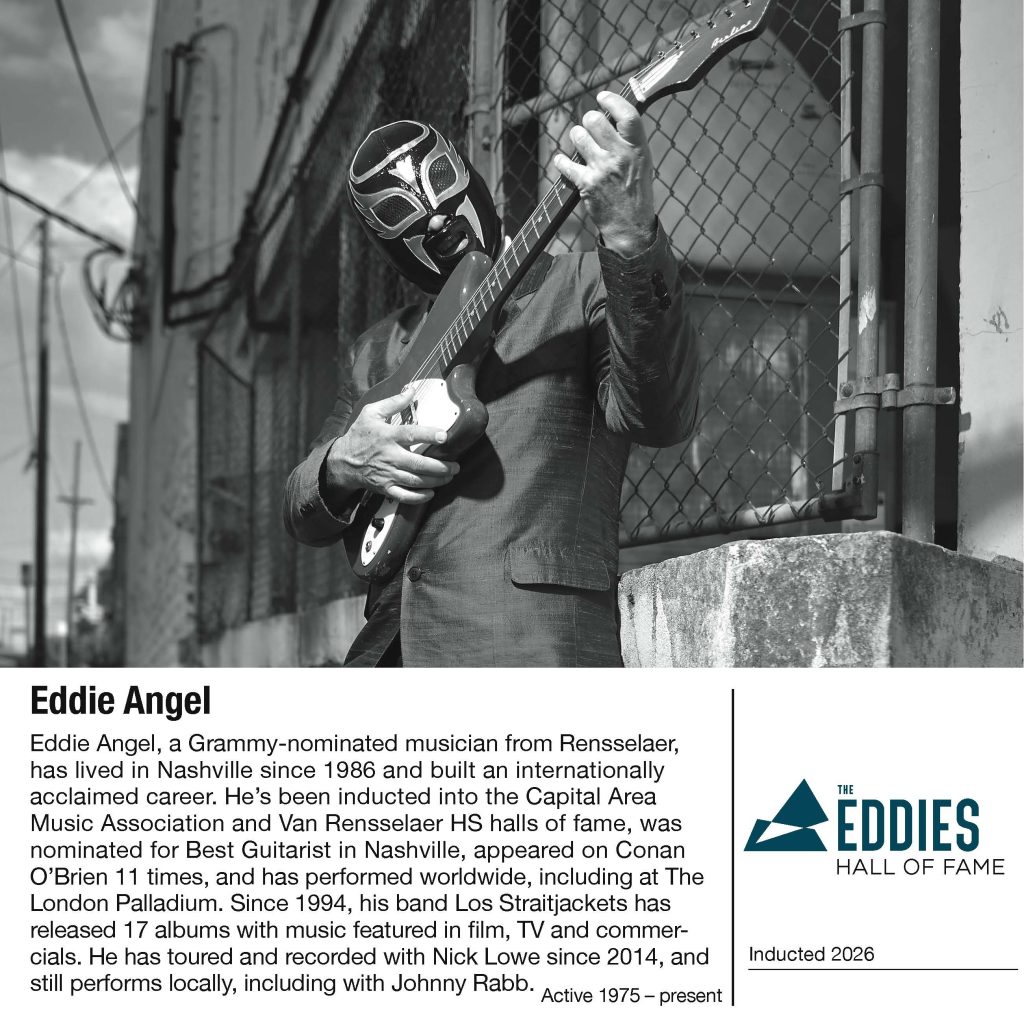
Read more
He was inducted into the Capital Area Music Association (CAMA) and Van Rensselaer HS HOF, nominated for Best Guitarist in Nashville, appeared on the Conan O’Brien show 11 times, played The London Palladium and has toured the US, Japan, Russia, Mexico, Australia and Europe. Since 1994 his band Los Straitjackets has recorded 17 albums and his songs have been used in many movies, TV shows and commercials. Since 2014 Eddie has been touring and recording with Nick Lowe. Locally he was a member of The Star Spangled Washboard Band and still performs today with local rocker Johnny Rabb.
Lee Shaw
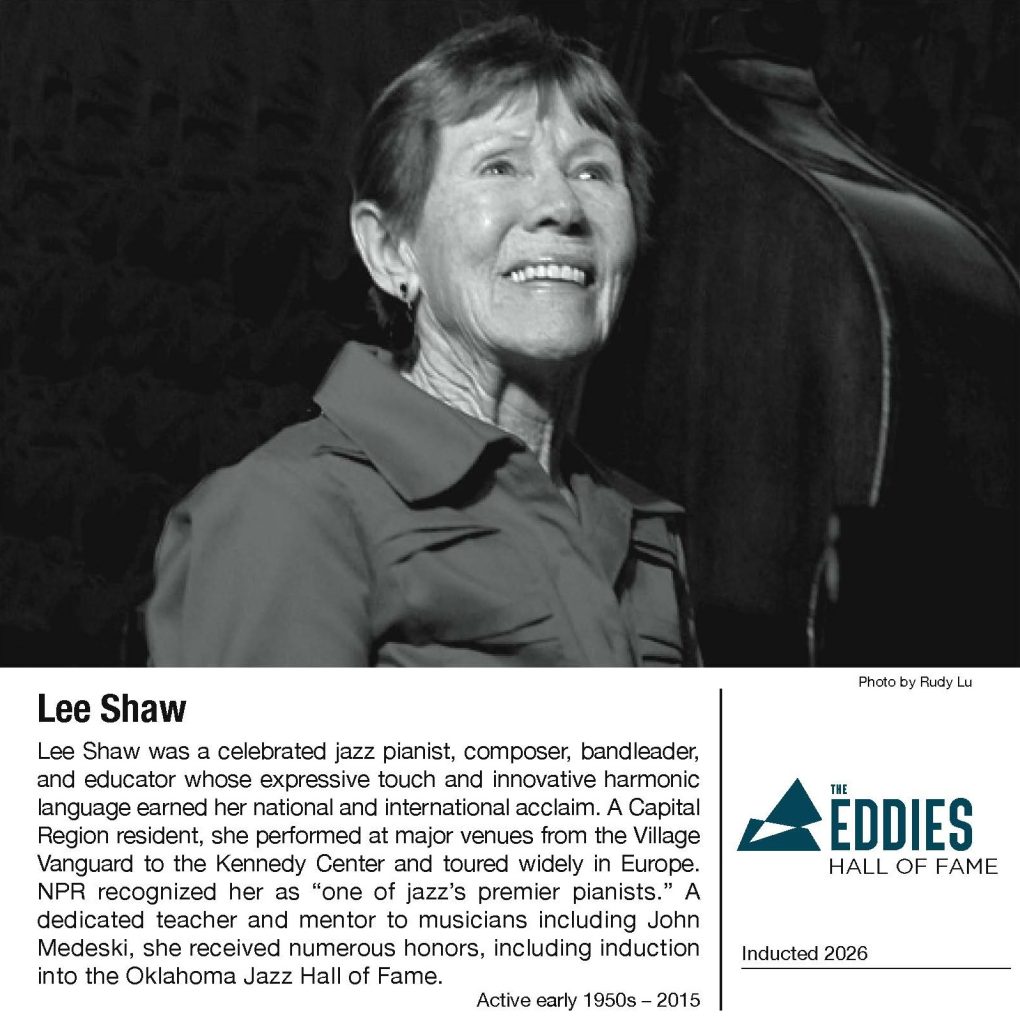
Read more
Owen McNally of The Hartford Courant called her “a modest, irresistible person of immodest, irrepressible talent,” guided by what seemed like a “religious calling for jazz.”
Shaw grew up in Ada, Oklahoma, absorbing American Songbook standards when they were new and cultivating a voracious appetite for all kinds of music. She earned a degree from the Oklahoma College for Women and a master’s in piano from the American Conservatory of Music in Chicago, where she quickly gravitated toward jazz, playing in clubs throughout the city. There she met drummer Stan Shaw, with whom she formed a piano trio and later married. Their career took them to Puerto Rico, where Lee studied with the legendary Jesú María Sanromá, and where Latin traditions deeply influenced her rhythmic and compositional approach.
After moving to New York City in the early 1960s, the Shaws performed at iconic venues including The Embers, the Village Vanguard, Minton’s Playhouse, the Half Note, and clubs throughout Harlem. They also appeared at the Apollo Theater during the benefit concert for the 1963 Dr. Martin Luther King Jr. March on Washington. Throughout her career, Shaw collaborated with and learned from major figures such as Oscar Peterson, Arnie Lawrence, Frank Foster, Pepper Adams, Zoot Sims, Al Cohn, Al Grey, Richard Davis, Slam Stewart, Eddie Jones, Eugene Wright, and Jymie Merritt. She was also a mentor to many musicians, most notably pianist John Medeski, who studied with her as a teenager.
Though invited by bandleaders like Lionel Hampton to join their ensembles, Shaw chose instead to focus on the artistic intimacy of her trio. She and Stan eventually settled in Albany, New York, where they became deeply embedded in the Capital Region’s jazz community. In the mid-1990s, as Stan’s health declined, Shaw formed a new trio with bassist Rich Syracuse and later drummer Jeff “Siege” Siegel, a configuration that would bring her renewed national and international attention.
The Lee Shaw Trio performed at major festivals and cultural institutions, including the Mary Lou Williams Jazz Festival at the Kennedy Center, the Lake George Jazz Festival, the Wall Street Jazz Festival, the Massry Center for the Arts, and concert series throughout New York State. They also performed widely in Oklahoma, and in 2006 Shaw and Syracuse played a featured concert at Steinway Hall in San Jose.
Her work received national recognition on Marian McPartland’s Piano Jazz, where NPR hailed Shaw—alongside McPartland and Mary Lou Williams—as “one of jazz’s premier pianists.”
Pianist, composer, educator, and bandleader Lee Shaw—born Londa Lee Moore in Cushing, Oklahoma—was a force of nature in American jazz. Performing into her late eighties with undiminished intensity, she was known for her distinctive sound: a sweeping harmonic language, impeccable time feel, and a touch described by JazzTimes critic Bill Milkowski as “divine.”Pianist, composer, educator, and bandleader Lee Shaw—born Londa Lee Moore in Cushing, Oklahoma—was a force of nature in American jazz. Performing into her late eighties with undiminished intensity, she was known for her distinctive sound: a sweeping harmonic language, impeccable time feel, and a touch described by JazzTimes critic Bill Milkowski as “divine.”
Shaw was also a devoted educator. From 1983 until her passing, she served as adjunct faculty at the College of Saint Rose and mentored countless students privately. Her philosophy was rooted in gratitude: “So many jazz musicians have been generous to me,” she often said. “The only way I can thank them is to pass on what I learned.”
Her achievements were recognized with numerous honors, including induction into the Oklahoma Jazz Hall of Fame (1993), an Honorary Doctorate from the College of Saint Rose (2002), and the Swingtime Lifetime Achievement Award (2001).
Lee Shaw passed away in Albany, New York, on October 25, 2015, leaving behind a legacy of innovation, generosity, and unwavering dedication to the art of jazz.
The visionaries of The Van Dyck
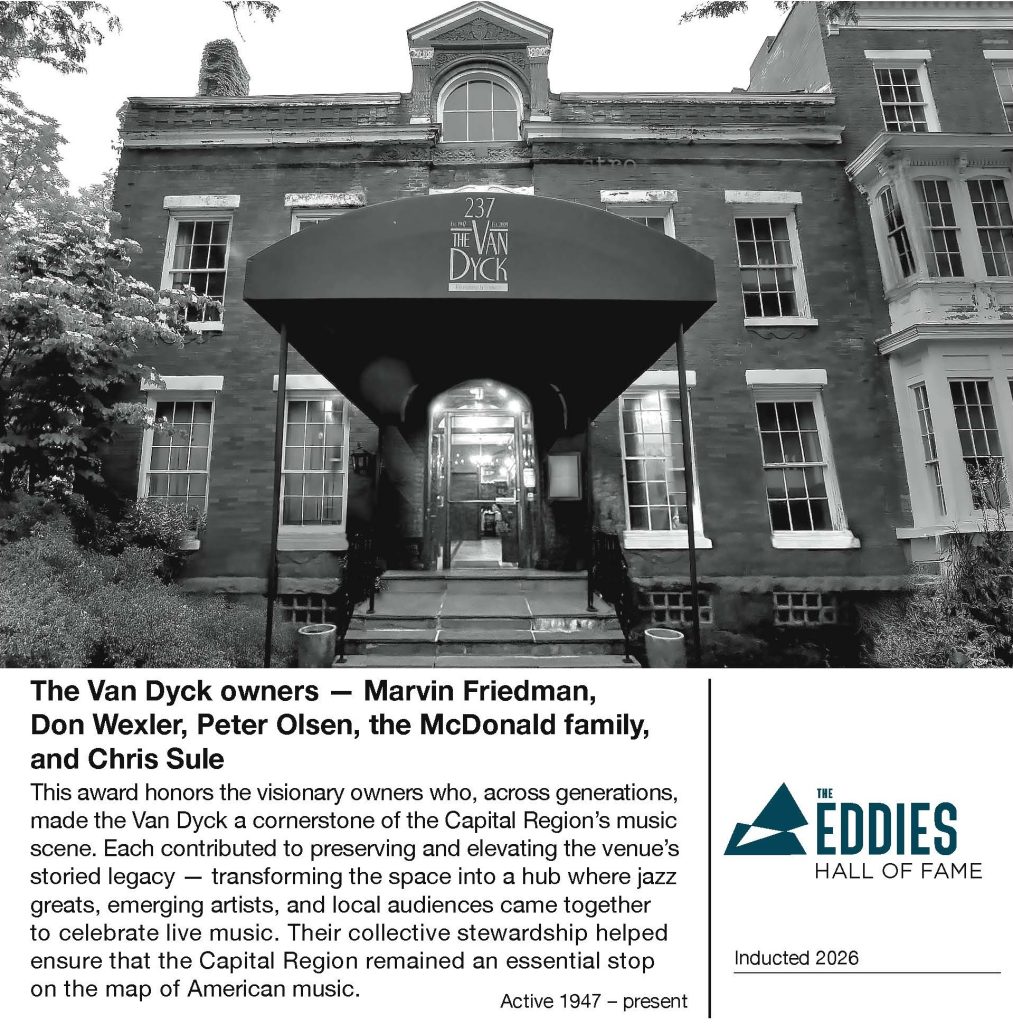
Read more
Marvin Friedman
Marvin Friedman was a visionary restaurateur, jazz advocate, and community leader whose instincts and passion helped shape Schenectady’s cultural identity. Born in Schenectady to Harry and Helen Friedman, he graduated from local public schools before attending Johns Hopkins University. After college, he served in the U.S. Navy in the Pacific during World War II, sending most of his pay home to his sister Ruth — savings he hoped would one day seed a business of his own.
Though his family imagined a career in medicine for him, Marvin’s heart was always in the arts. He loved music, theater, dancing, and travel. After his military service, he moved to Miami and worked in a lively supper club, discovering the excitement of nightlife, live entertainment, and hospitality. Inspired, he returned to Schenectady, determined to create something similar in his hometown.
In 1947, Marvin purchased a small French restaurant on Union Street in the Stockade and convinced Ruth to join him as the cook — using her own dishes and cookware — while he ran the front of house. Together, they transformed the space into The Van Dyck, a restaurant and music venue that quickly became one of the Capital District’s most iconic gathering places.
Marvin began presenting live jazz almost immediately. A frequent traveler to New York City, he forged friendships with musicians and brought a steady stream of top-tier talent to Schenectady. Under his guidance, The Van Dyck grew into the region’s premier jazz venue, helping introduce generations of listeners to world-class music. He often said, “I’ll never get rich bringing jazz to Schenectady, but the people here will be richer for hearing it.”
Beyond music, Marvin was deeply committed to the community. He was a longtime supporter and board member of the Schenectady Museum (now miSci), an early champion in the movement to save and revitalize Proctors, and a generous donor to numerous local organizations—often sending food, or personally delivering holiday meals to those in need.
A man of many passions, Marvin was a Grand Master bridge player who traveled the country for tournaments, a member of the Schenectady Curling Club, and an enthusiastic water-skier and boater on Lake George. Though he never married, he helped raise his nephew Don after the passing of Don’s father, becoming both a patriarch and a beloved grandfather figure to Don’s children.
Marvin Friedman passed away in April 1985 at age 74, leaving behind a legacy that shaped Schenectady’s arts, culture, and community spirit for decades to come.
Donald Wexler
Donald Ira Wexler was a devoted family man, community-minded businessman, and the guiding force behind the Van Dyck’s emergence as one of the most important jazz venues in Upstate New York. Born in Schenectady to Leon and Ruth Wexler, Don spent his earliest years traveling with his parents to construction job sites before the family settled permanently in the home his father built. When Don was just four, his father passed away, and during the war years, his grandmother and aunts joined the household, surrounding him with close family support.
Music was woven into Don’s life from the beginning. His mother played piano daily, his Uncle Bill sent him the latest records from his music store in North Carolina, and his Uncle Marvin—founder of The Van Dyck—introduced him to jazz. A radio was always on, whether in his room or his car, and music became a lifelong companion.
After attending Oneida School and Nott Terrace High School, Don graduated from The Manlius School in Manlius, NY, and went on to earn a degree in hotel and restaurant management from Michigan State University. His early career took him to Tarrytown, NY, and the Washington, D.C. area, where he managed college food service operations. In 1966, he returned to Schenectady to run the Jamaica Inn, a local nightclub and restaurant.
In 1974, Don joined his Uncle Marvin and mother Ruth in running The Van Dyck. He soon took on booking responsibilities, ushering in the era that would cement The Van Dyck as the premier jazz club in Upstate New York. Under Don’s stewardship, the venue hosted an extraordinary roster of musicians and became a beloved cultural cornerstone until its closing in 1994.
Don married Margaret, and together they shared 58 years of marriage and raised four children—Donna, Elizabeth, Deborah, and Geoffrey—who were the pride of his life.
He is remembered for his warmth, his humor, his unwavering commitment to family, and his essential contributions to a music institution that touched countless lives throughout the Capital Region.
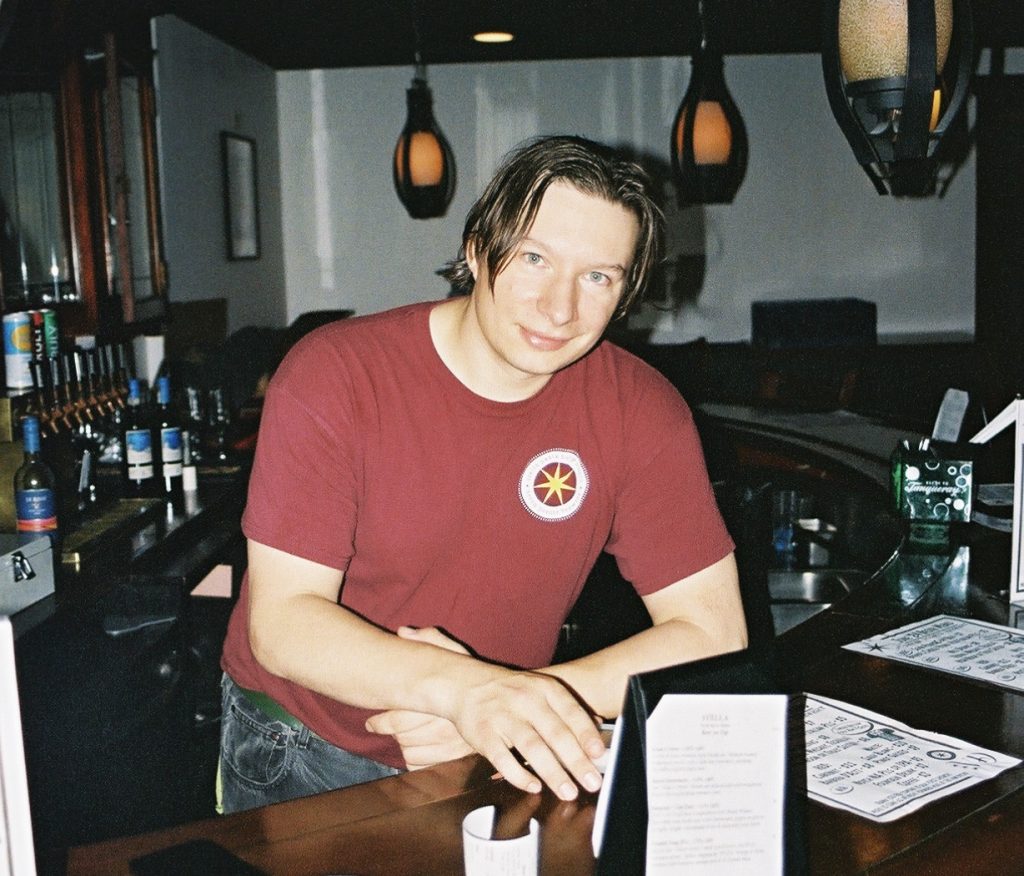
Raised on Long Island and in the Capital Region, Saratoga Springs High School Class of 2009, Chris Sule has long been a familiar face in the local music and hospitality scenes. In 2016, he opened Stella Pasta Bar & Bistro (originally Stella Pasta Bar & Bakery) in Burnt Hills alongside his mother, Lisa, and stepfather, John.
From the beginning, Lisa made live music part of Stella’s identity, inviting friends from favorite Saratoga venues like Gaffney’s, One Caroline, and Circus Café to perform in their cozy space.
After Lisa’s passing in 2020, Chris took over the entertainment programming, carrying on her vision of community through music. Following the challenges of the pandemic and a relocation, the team found new life in Schenectady’s historic Van Dyck. When Stella reopened there in October 2022, Seven Points Brewery launched simultaneously — and live music returned to the venue that very weekend.
Within a year, Sule expanded programming to honor the building’s jazz legacy, introducing Saturday Night Jazz as a weekly tradition. By October 2024, with Stella and Seven Points firmly established, he debuted the newest chapter in the venue’s storied history: the Van Dyck Music Club. Since then, the space has hosted jazz, comedy, drag, burlesque, and mystery dinner theatre — continuing its evolution as a cornerstone of the Capital Region’s live entertainment scene.

